
 |
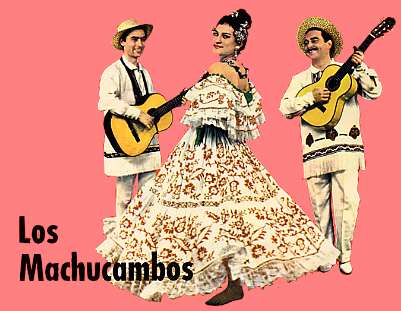 Southern Native Americans made an instrument called a charango from the skin of an animal known in Latin America as a machucambo. Together, Rafael Gayoso, Mathias Romano Zanotti and Julia Cortes are the Machucambos.
Southern Native Americans made an instrument called a charango from the skin of an animal known in Latin America as a machucambo. Together, Rafael Gayoso, Mathias Romano Zanotti and Julia Cortes are the Machucambos. "Amor Amor", a delicate romantic classic has Romano Zanotti in the lead giving Mel Torme or Dean Martin some competition. The galloping "La Palomita" shows off the famed charango in a new Machucambo arrangement. And lastly, but first on the LP, "La Cucaracha", if any tune south of the Rio Grande is worn out then this is it, but even this sounds good when done in a percussive based way by Los Machucambos.
"Amor Amor", a delicate romantic classic has Romano Zanotti in the lead giving Mel Torme or Dean Martin some competition. The galloping "La Palomita" shows off the famed charango in a new Machucambo arrangement. And lastly, but first on the LP, "La Cucaracha", if any tune south of the Rio Grande is worn out then this is it, but even this sounds good when done in a percussive based way by Los Machucambos.
 Folklore Of The South Folklore Of The South SW 99002 (1961) Side 1: 1. La Bamba*, 2. Poncho De 4 Colores, 3. La Bahuala, 4. Soy Tolimense, 5. Quireme Side 2: 1. Duerme Negrito, 2. El Aventurero, 3. El Pobrecito, 4. Macongo, 5. La Leyenda De Los Volcanes Notes: La Bamba is a different recording from Percussive Latin Trio, perhaps earlier and a bit wilder. |
 Percussive Latin Trio Percussive Latin Trio SP 44012 (1962) Side 1: 1. La Cucaracha, 2. La Palomita, 3. Amor Amor, 4. Pajaro Campana, 5. Otorino Laringolo, 6. Granada Side 2: 1. La Bamba, 2. Pepito, 3. Perfidia, 4. Cascada, 5. Subo Subo, 6. Adios Note: Released in U.K. as "In Phase 4" PFS 34006 |
 Dansez Avec Los Machucambos (No.2) Dansez Avec Los Machucambos (No.2)MLP 10028 (1962) Side 1: 1. Non Monsieur, 2. El Silbido de ese tren, 3. Samba de Minha Terra, 4. El Choclo, 5. Cuando Calienta el Sol, 6. Samba de Perroquet Side 2: 1. Dona Rosa, 2. Purito, 3. Fabulosa, 4. Espéranza, 5. El Proffesor, 6. Samba Torto Note: Stereo edition exists, SLP 20028 |
 Los Machucambos Los MachucambosMLP 10039 (1963) Side 1: 1. La Lune, 2. Professor Bach, 3. Mira Mirame, 4. La Bamba de Colas, 5. La Chinqua, 6. La Mamma Side 2: 1. Quand je Danse avec, 2. Marie Elena, 3. Ciel de Lit, 4. El Watusi, 5. Melinda, 6. El Pescador Note: Different version of Maria Elena from Mucho Machucambos. |
 Mucho Machucambos Mucho Machucambos SP 44055 (1964) Side 1: 1. Cachita, 2. Adios Irene, 3. Misionera, 4. Maria Elena, 5. El Tren, 6. Naranjita Side 2: 1. El Rancho Grande, 2. Yo Vendo Unos Ojos Negros, 3. Ojos Verdes, 4. Valsecito, 5. Reservista, 6. Adios Pampa Mia Notes: Decca U.K. is PFS 4056 |
 Caramba! Caramba! SP 44084 (1967) Side 1: 1. El Cumbanchero, 2. El Manicero, 3. La Parranda, 4. Concierto En La Llanura, 5. El Caiman, 6. Brazil Side 2: 1. Alma Llanera, 2. Tico-Tico, 3. Cielito Lindo, 4. La Playa Colorada, 5. Manana, 6. Garota De Ipanema Notes: Decca U.K. is PFS 4089 |
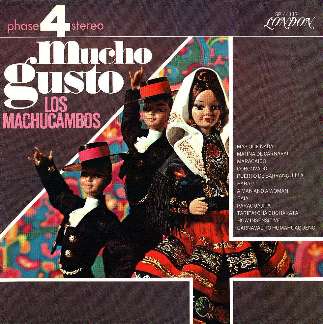 Mucho Gusto Mucho Gusto SP 44117 (1969) Side 1: 1. Mas Que Nada, 2. Mahna De Carnaval, 3. Maracaibo, 4. Corcovado, 5. Puerto De Barranquilla, 6. Babalu Side 2: 1. A Man And A Woman, 2. Baia, 3. Paraguajita, 4. Taripai Cha Cucharata, 5. How Insensitive, 6. Carnavalito Humahuaqueno Notes: Decca U.K. is PFS 4155 |
 Sing The Music Of Venezuela Sing The Music Of Venezuela TW 91434/SW 99434 (1969) Side 1: 1. Nau Nau, 2. Los Garceros, 3. Amalia Rosa, 4. Nuestro Amor, 5. Jose Maria, 6. Un Setoconao Side 2: 1. Alma Llanera, 2. Muchachita Sabanera, 3. Ay Josefina, 4. Madrugada Llanera, 5. El Guapo, 6. El Polo Stereo and mono editions exist |
 Sing The Music Of Argentina Sing The Music Of Argentina TW 91435/SW 99435 (1969) Side 1: 1. Los Ejes de Mi Carreta, 2. Carnavalito Humanuaqueno, 3. Angelica, 4. Tarpai Cha Cucharata, 5. Soy Libre, 6. Viene Clareando Side 2: 1. La Toloeria, 2. Viva Jujuy, 3. Vioala del Culampaja, 4. La Loca, 5. Mama Vieja, 6. Hasta Otro Dia Stereo and mono editions exist. |
 Sing The Music Of Peru Sing The Music Of Peru (Oct. 1969) Side 1: 1. Quiereme, 2. La Traidora, 3. Si Me Quieren Quiero, 4. Fina Estampa, 5. Negro Tamborilero, 6. Sol De Cuzco Side 2: 1. El Huaquero, 2. Yo Te Ame Con Locura, 3. Sauce, 4. Que Nadie Sepa Mi Sufrir, 5. Deja La Rosa en Boton, 6. Bailen Ninas Stereo and mono editions exist |
 Musica Latina And Love Musica Latina And Love SP 44165 (1971) Side 1: 1. El Condor Pasa, 2. Noche De Ronda, 3. Frenesi, 4. Ti-Pi-Tin, 5. Maria La O, 6. Adios Mi Chaparrita Side 2: 1. Tristeza, 2. Acercate Mas, 3. Ay Cosita Linda, 4. Solamente Una Vez, 5. Tres Palabras, 6. Cuando Vuelva A Tu Lado Notes: Decca U.K. is SP 44238 |
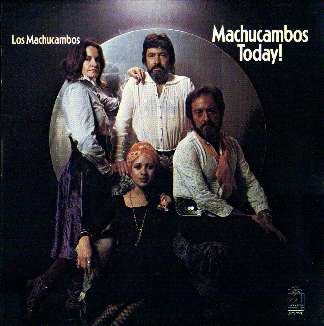 Machucambos Today Machucambos Today SP 44280 (1977) Side 1: 1. Cuando Calienta El Sol, 2. Guantanamera, 3. Pepito, 4. La Cucaracha, 5. Eso Es El Amor, 6. La Bamba Side 2: 1. Chevere, 2. Te Recuerdo Amanda, 3. Paseando Por La Sabana, 4. Samba En Preludio, 5. En Noche De Enero, 6. Aquellos Ojos Verdes Notes: All are new recordings. Titled Machucambos '77 on some editions with the photo inside and artistic lettering on the front. |
 450.875 (1959) 450.875 (1959)Reissued as 460.875 Standard/Monophonic |
 450.877/STO 95.500 450.877/STO 95.500Du film "Orpheu Negro" |
 450.884 (Dec. 1959) 450.884 (Dec. 1959)Also: STO 95.503 Monophonic & Stereo |
 450.960 (June 1960) 450.960 (June 1960)Standard/Monophonic |
 450.999 (Sept. 1960) 450.999 (Sept. 1960)Du film "Os Bandeirantes" Standard/Monophonic |
 451.009 (Dec. 1960) 451.009 (Dec. 1960)Reissued as 460.009 Standard/Monophonic |
 451.069 (July 1961) 451.069 (July 1961)Reissued as 460.069 Standard/Monophonic |
 451.102 (Feb. 1962) 451.102 (Feb. 1962)Reissued as 460.102 Standard/Monophonic |
 451.123 (May 1962) 451.123 (May 1962)Reissued as 460.123 Standard/Monophonic |
 451.127 (1962) 451.127 (1962)Reissued as 460.127 Standard/Monophonic |
 451.140 (1962) 451.140 (1962)Reissued as 460.140 Standard/Monophonic |
 460.767 (Oct. 1962) 460.767 (Oct. 1962)Standard/Monophonic |
 460.769 (Feb. 1963) 460.769 (Feb. 1963)Standard/Monophonic |
 460.770 (Dec. 1962) 460.770 (Dec. 1962)Standard/Monophonic |
 460.774 (June 1963) 460.774 (June 1963)Standard/Monophonic |
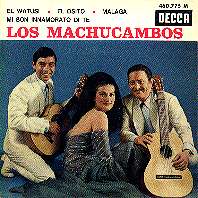 460.775 (July 1963) 460.775 (July 1963)Standard/Monophonic |
 460.803 (Nov. 1963) 460.803 (Nov. 1963)Standard/Monophonic |
 460.809 (Dec. 1963) 460.809 (Dec. 1963)Standard/Monophonic |
 460.860 (July 1964) 460.860 (July 1964)Standard/Monophonic |
 460.891 (Dec. 1964) 460.891 (Dec. 1964)Standard/Monophonic |
 460.897 (1965) 460.897 (1965)Stereo |
 460.931 460.931Standard/Monophonic |
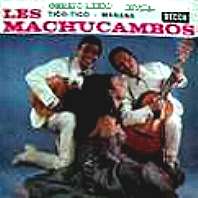 460.975 460.975Standard/Monophonic |
 70.941 (Feb. 1964) 70.941 (Feb. 1964)Decca France Mono |
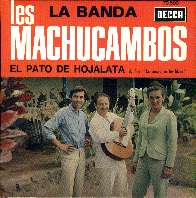 79.500 (Mar. 1967) 79.500 (Mar. 1967)Decca France Stereo |
 79.520 (Feb. 1968) 79.520 (Feb. 1968)Decca France Stereo |
 79.566 (June 1970) 79.566 (June 1970)Decca France Stereo |
 79.581 (Dec. 1970) 79.581 (Dec. 1970)Decca France Che Stereo |
 79.586 (July 1971) 79.586 (July 1971)Decca France Stereo |
 83.011 (Nov. 1971) 83.011 (Nov. 1971)Decca France Stereo |
 84.163 (1973) 84.163 (1973)Decca France Stereo Notes: Illustration by R. Zanotti |
 3.567 (1973) 3.567 (1973)Vega |
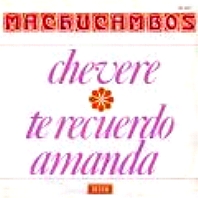 84.221 (1974) 84.221 (1974)Decca France |
 85.026 85.026Decca France |
 86.023 86.023Decca France |
 86.551 86.551Decca France |
 16.698 (1979) 16.698 (1979)Sonopresse Stereo |
 Los Machucambos/Los Indios Los Machucambos/Los IndiosUniversal/Super Majestic SBBH 1.760 (1963) Side 1: Deixa De Tristeza, Buenos Noches*, El Rodeo, La Bamba*, Cabeza Inchada, Rinquincalla* Side 2: A Mi Palomita*, La Casita, Quatre Preguntas*, Caminhemos, El Huazo*, Me Estoy Congelando Note: * = Machucambos tracks circa 1959 with Milton Zapata. The other six tracks are by Los Indios Tabajaras. |
 A L'Olympia A L'Olympia Decca France 110.020 (1971) Side 1: Si Me Quieren Quiero, Pancho De 4 Colores, Recuerdos De Calaguallo, El Condor Pasa, Hasta Siempre Comandante, Quiereme, La Piragua Side 2: La Llorona, Amalia Rosa, Los Garceros, La Bamba, Samba Da Minha Terra, Samba En Preludio, Tristeza Stereo |
 Olympia 1973 Olympia 1973Decca France 115.142 (1973) Side 1: El Canelazo, Vasija de Barro, Bailen Ninas, Pataruzca Sol de Cuzco, Hasta Siempre Comandante Side 2: Los Ninos de la Guerra, A Felicidade Leau de Coleira, Saudade de Bahia Alo Madrugada, La Mamma Stereo |
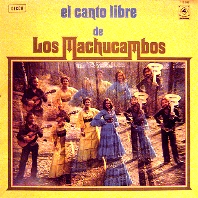 El Canto Libre El Canto Libre Decca France 115.283 (1974) Side 1: 1. Es La Libertad, 2. Voy Pa La Ciudad, 3. En Noche De Enero, 4. Mi Ochun, 5. Felicidades Para Ti Side 2: 1. Chevere, 2. Es Cando, 3. Ae Elegua, 4. Bajando P'al Mar, 5. Perdoname Jesus |
 Machucam'Bossa Machucam'Bossa London 115.256 (1975) Side 1: 1. Samba Da Rosa, 2. Me Deixa Em Paix, 3. Canto De Oxum, 4. Tarde En Itapoan 5. Che Cosa C'e, 6. Tio Maravilha Side 2: 1. Rosa 25, 2. Apelo, 3. Marchinha Pra Angela Davis, 4. Aguafuerte Del Brasil, 5. A Tonga Da Mironga, 6. Samba Da Benedicao |
 Liberte Sans Colere Liberte Sans Colere Sonopresse (France) 2S 068 16696 (1979) Side 1: 1. Donde Volabas, 2. Crece El Rio, 3. Taureau, 4. Rey De Esperanza, 5. Jones Town Side 2: 1. Caria Elena, 2. Urubamba, 3. La Luna, 4. Libertad Sin Ira, 5. La Spiaggia Di Sabbia |
 La "Salsa" La "Salsa" Arion (France) 34583 (1980) Side 1: 1. Salsa de Tomate, 2. Rio Manzanares, 3. Al Vaiven de mi Carreta, 4. El Hijo de Elegua, 5. Que yo me Pongo Celoso, 6. Duerme Negrito Side 2: 1. Quimbara, 2. Se que Tu, 3. La Vista, 4. Santa Isabel, 5. Salsa Maionesa |
 La Fiesta La FiestaPolydor 7178035 (1983) Side 1: Side 2: |